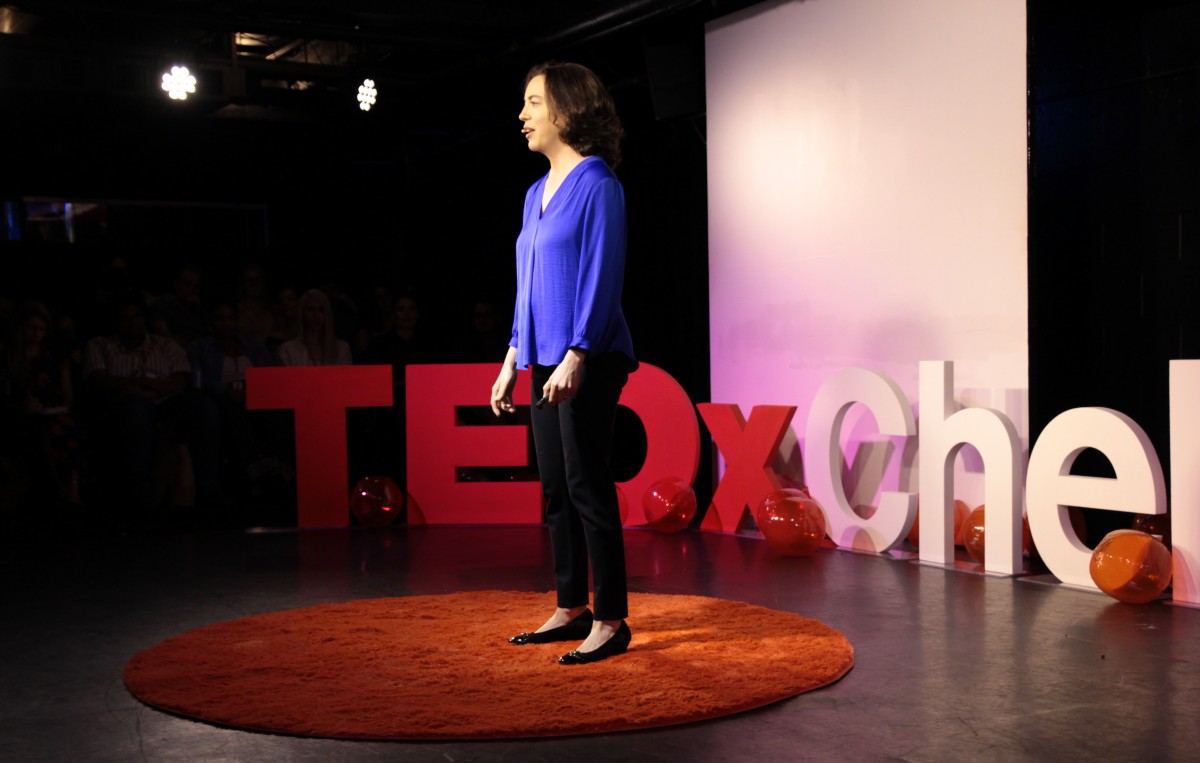The best, hard, surprising and rewarding parts of giving a TEDx talk

Dear friends,
Thank you so much to many of you who have asked, “How’d the TEDx talk go?” and “When can I see the video? I’ve searched and I can’t find it online!”
I’m grateful for your interest, and I’ve done my best to answer below…
How’d the TEDx talk go?
It was an amazing experience. Here are some behind-the-scenes highlights:
My favorite part
My favorite part of the experience was getting to meet the 10 TEDx speakers who took the stage before and after I did. I learned a tremendous amount from each of them, and I wrote about two of them in my last post. Two more touching talks were by Kevin Curry, whose brand Fit Men Cook is followed by 1.4 million people on Instagram, and who spoke about the connection between our emotions and food, and by Teddy Quinlivan, who spoke honestly about her experience coming out and being accepted as the first transgender supermodel.
Practicing and giving my talk alongside each of these extraordinary 10 people gave me the same “high” I used to get when I sang with my a capella group on the streets of Jerusalem in college. That amazing feeling of supporting each other through the preparation (which the TEDx group did in the weeks leading up to the event), doing something together that is both exhilarating and a little scary, and celebrating together when you’re done (which we did in the restaurant across the street afterwards!).
The hardest part
While I can safely say that the entire process challenged me to raise my game, the hardest part of giving the speech was not writing or even giving it, but memorizing it.
I’ve given many talks with live audiences before, but this was the first one where I was only allowed to speak for 8 minutes. That very specific time allotment meant that I couldn’t add things in at the last minute or ad-lib, or I’d risk going over time, which would be against the rules and take away time from my fellow TEDx speakers.
To manage this, TEDx has a tradition in which speakers are asked to write and remember their transcripts. Now, it’s debatable whether this is a useful practice, and some people I deeply respect have urged TED speakers not to memorize their speeches line for line (including my neighbor, the renowned marketing expert Seth Godin, in his blog post on June 18, a few days before I gave my talk).
While I agree in theory that memorizing lines is not a good idea, in reality, the pressure not to go overtime and ensure I could remember all I wanted to say convinced me to try to commit my speech to memory.
Luckily, I was fortunate to work with two outstanding speech coaches, Jim Fyfe and Kimberly Marcus. Jim was referred to me by Susan Cain, who gave one of the top TED talks of all time, “The Power of Introverts,” and Kimberly was one of three excellent coaches who were part of the TEDx organizing team in NYC.
Jim taught me a valuable memorization practice. He told me to say my speech 10 times faster than I normally would, over and over again. I did this, and it worked like a miracle. I think one reason it works is that it enables the words to come to your brain faster than they can come to your mouth. By the time your mouth has to say them, they’re already in your mind, just waiting to be spoken. If you try this method, let me know how it goes!
The surprising part
The thing I hadn’t thought much about regarding how TED talks work is that while they’re spoken before live audiences, the videos are edited. This means that watching them as part of a live audience is a bit different from watching them on video.
The speakers were asked to bring 3 copies of our talks with us, and to hand them to the organizers. If we forgot our lines when we were speaking, we could call out, “Line!” and one of the organizers would feed us a line until we got back on track.
I was speaking about something so personal– conflict with my mother. It didn’t feel appropriate to me to stop and yell, “Line!”
Anyone watching in the live audience or on Livestream knows that I got a bit choked up talking about an emotional part of my story at one point, so I paused for a moment and closed my eyes. Then I took a deep breath and began again, and was relieved that I didn’t need to yell, “Line!”
I’m curious to see whether the editors will edit that pause out of the video or not. We’ll find out in a week!
The most rewarding part
Getting to work with the talented TEDx organizers and coaches, having friends give me feedback and cheer me on, meeting the other speakers, and writing and speaking about my passion — how to free yourself from conflict — were all incredibly rewarding.
But the MOST rewarding part of the process was walking off the stage and into the after-party, and immediately being met by people who said, “I’ve been there too.” I spoke about how I freed myself from a tough family conflict, using 3 of the practices that I’ve been teaching organizational leaders for a decade.
This was an emotional process for me, and my story struck a chord. One man came up to me and showed me his text chain with his son from earlier that day. A woman hugged me and thanked me for reminding her to call her father. Another told me that she and her sister, who was also in the audience, looked at each other knowingly while I was speaking, because their mom passed away recently, and oh how they missed her and wished they could call her.
People told me their stories– their triumphs and tribulations–about connecting, and sometimes missing opportunities to connect, with the people they love. And that’s what the work of conflict freedom is all about: pausing to notice what’s happening, and doing the work to free yourself so you can connect with who and what are most important to you.
I hope this message will continue to inspire people as the video, and book, make their way into the world.
When can I see your talk?
It is currently being edited by the TEDx organizers and it should be posted on YouTube next week (or the week after). As soon as it is, if you put your email address in the comments below, I will email you the link. I promise. I can’t wait for you to see it and to let me know what you think.
Thanks for taking this journey with me. I look forward to sharing more of it with you.
With wishes for a safe and peaceful summer,
Jen
Jennifer Goldman-Wetzler, Ph.D. is the Founding Principal of Alignment Strategies Group, a NYC-based consultancy that helps CEOs and their teams achieve optimal organizational health and growth. Her book, Optimal Outcomes: Free Yourself from Conflict, is due to be published by HarperBusiness in Spring 2020. She writes about conflict and leadership at alignmentstrategiesgroup.com. Follow her on LinkedIn @JenGoldmanWetzler, on Twitter, @JGoldmanWetzler, and on Facebook, facebook.com/alignmentstrategiesgroup. Download the free guide “8 Practices to Free Yourself from Conflict” at optimaloutcomesbook.com
Subscribe to the newsletter and learn to achieve optimal outcomes.
When you sign up, you'll also receive a complimentary Optimal Outcomes Workbook.
"*" indicates required fields


